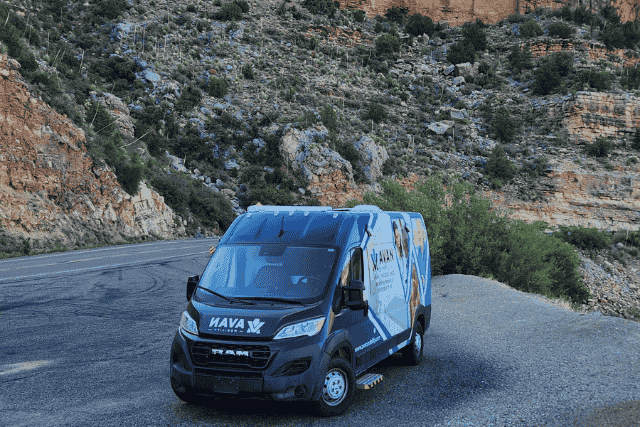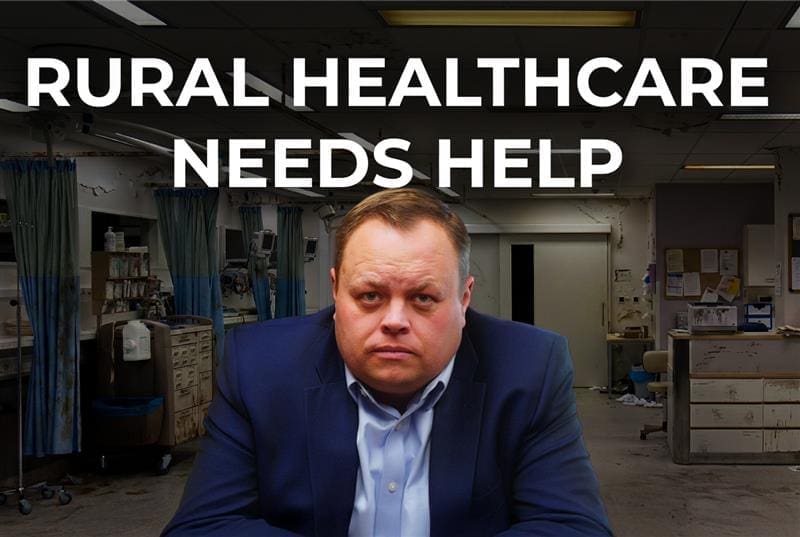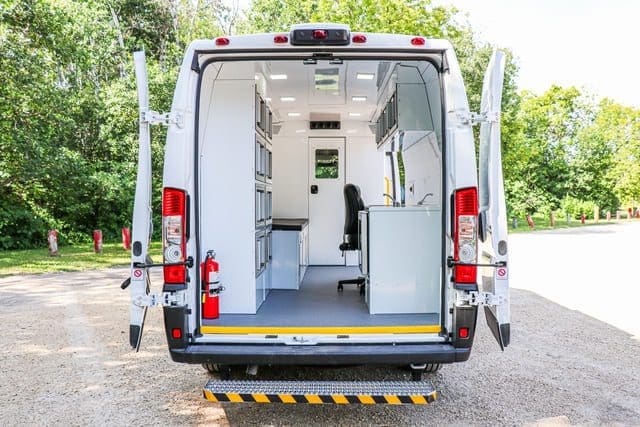Did you know that over 15% of Arizona’s rural population struggles to get basic healthcare services? That’s why mobile clinics are such a big deal across places like Tucson, Flagstaff, Yuma, and smaller towns like Globe or Douglas. But here’s the thing: mobile clinic maintenance in Arizona can quickly turn into a challenge if you don’t plan for it.
Think about this for a second. If your mobile clinic breaks down in the middle of nowhere, what happens?
- Patients miss care
- Your staff gets stuck
- The community you serve suffers
That’s a gap you cannot ignore. And let’s be honest, it can feel overwhelming wondering how to manage all this in the desert heat, rough roads, and long distances between towns.
At AVAN Mobility, we’ve spent over 10 years working with healthcare teams, non-profits, and government organizations across the U.S., including partners like Pacific Clinics. We build vehicles that remove barriers to healthcare while keeping real-life needs in mind, such as comfort, safety, and reliability. And while we believe in what we do, we know you have options. This article is here to help you through your challenges and decide what works best.
Here’s what you’ll learn:
- Challenges with mobile clinic maintenance in Arizona
- How to handle these challenges
What are the challenges with mobile clinic maintenance in Arizona?
Mobile clinic maintenance in Arizona comes with some real challenges that organizations like yours can’t afford to overlook. Arizona’s landscape, climate, and long distances between cities make things a little trickier compared to other states. If you are not prepared for these challenges, you could end up with unexpected costs, frustrated staff, and, most importantly, missed care for the people who depend on you.
Let’s walk through the biggest challenges you need to think about before hitting the road in Arizona.
1. Distance can throw a curveball in mobile clinic maintenance in Arizona
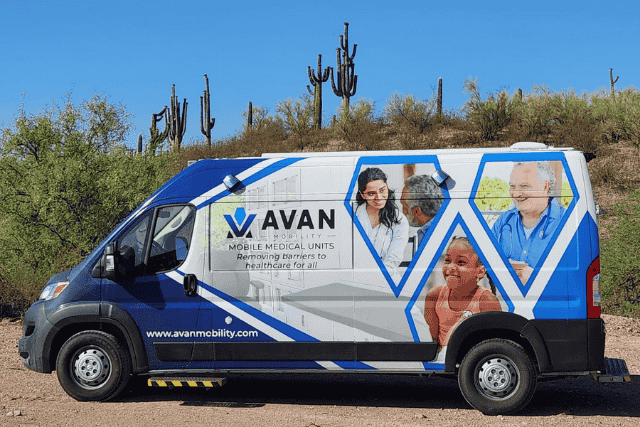
Arizona is huge. Cities like Phoenix, Flagstaff, Tucson, and Yuma are hours apart. If your mobile clinic serves rural towns like Globe, Douglas, or Show Low, you could drive hundreds of miles each week. And all this driving adds stress to your vehicle. Parts wear out faster. Tires need replacing sooner. Suspensions and brakes take a beating on rough desert roads.
Now imagine this: Your mobile clinic breaks down halfway to a community outreach event in Safford or Page. What happens next? You might be miles away from a shop that even knows how to work on a custom mobile clinic. Worse, you may need rare parts that no local mechanic carries. If you bought a used clinic or picked a van from an unproven manufacturer, this problem grows. Custom parts might not even exist anymore. Now you’re stuck. Your clinic sits useless for days or weeks, while patients go without care.
How do you handle the distance challenge with mobile clinic maintenance in Arizona?
- Choose a trusted, proven builder: AVAN Mobility uses van chassis like the RAM Promaster, which is easy to service almost anywhere.
- Stick to common builds: A RAM Promaster build means you can visit any nearby RAM dealership for maintenance. There’s no hunting for rare parts.
- Map out service stops: Know in advance which towns have RAM service centers or reliable mechanics.
- Avoid risky used units: Older or off-brand builds might need parts no longer made.
With these tips, you can take the sting out of long-distance maintenance in Arizona.
Where are the RAM Promaster dealerships in Arizona?
There are dozens of RAM Promaster dealerships in Arizona from which you can choose.
Here are a couple to consider:
| Dealership | City | Address |
| Avondale Ram Trucks Dealership | Avondale | 10101 W Papago Fwy, Avondale, AZ 85323 |
| Bullhead City Ram Trucks Dealership (Swanty’s) | Bullhead City | 2494 S Highway 95, Bullhead City, AZ 86442 |
| Casa Grande CDJR / Jerry Seiner CDJR | Casa Grande | 1990 N Pinal Ave, Casa Grande, AZ 85122 |
| Cottonwood Ram Trucks Dealership | Cottonwood | 792 State Rte 89A, Cottonwood, AZ 86326 |
| Larry H. Miller Dodge Ram Peoria | Peoria | 8665 West Bell Road, Peoria, AZ 85382 |
| Larry H. Miller Dodge Ram Tucson | Tucson | 4220 E 22nd St, Tucson, AZ 85711 |
| Chapman Dodge CJ-R Scottsdale | Scottsdale | 3800 N 89th St, Scottsdale, AZ 85251 |
| Chapman Dodge CJ-R Yuma | Yuma | 349 E 32nd St, Yuma, AZ 85364 |
| Central Car Care | Phoenix | 301 E Dunlap Ave, Phoenix, AZ 85020 |
| Chapman Dodge CJ-R Yuma | Yuma | 349 E 32nd St, Yuma, AZ 85364 |
| Ed Morse CDJR | Sierra Vista | Near 520-458-8000, Sierra Vista, AZ |
| Earnhardt CDJR | Gilbert | 1521 E Drivers Way, Gilbert, AZ 85297 |
| Larry H. Miller CJDR Surprise | Surprise | 13165 N Autoshow Ave, Surprise, AZ 85388 |
| Friendly Auto Centers | Mesa | 5026 E Main St #25, Mesa, AZ 85205 |
| Central Car Care | Phoenix | 301 E Dunlap Ave, Phoenix, AZ 85020 |
| J-N-J Auto Service | Phoenix | 3528 W Cactus Rd Suite B, Phoenix, AZ 85029 |
| Mac’s Complete Auto Repair | Chandler | Chandler, AZ |
2. Long wait times can make Arizona mobile clinic maintenance frustrating
Here’s a rough thought: You made it to a town like Kingman or Sierra Vista, your mobile clinic starts acting up, and the alternator fails. Bad luck, right? You manage to find the only mechanic in town willing to look at it. But here’s the problem: they’ve never seen this kind of mobile clinic before. They scratch their head, check the part, and then say, “I’ve got to order this… no clue how long it’ll take.”
Suddenly, you’re stuck. And you could be waiting days or weeks. Meanwhile, the people who depend on your services, like in rural health programs or homeless outreach efforts, get nothing. No care. No help. And your team waits, burning budget, while the clinic sits in the shop.
This happens all the time when organizations buy used units or work with lesser-known builders. Custom or rare parts slow everything down. Local shops simply don’t stock or recognize the parts, which drags out repairs and gets in the way of your mission to deliver care.
How can you handle the long wait time challenge?
- Pick a vehicle with common, familiar parts: When you choose a mobile clinic from a manufacturer that builds out of a more common brand, there’s a higher chance that parts are easier to come by when you take it to get serviced. When shops see a Promaster, they know what they’re dealing with. This means faster diagnosis and quicker repairs.
- Avoid custom or rare builds: Less common parts can mean longer waits for replacements, sometimes weeks.
- Get a service plan in place: Work with your manufacturer to understand where the best service locations are across Arizona.
Choosing the right vehicle upfront saves you headaches, money, and time down the road.
3. Extreme heat
Arizona can get really hot. In places like Phoenix and Yuma, summer temps can hit 110°F or higher for weeks at a time. This heat is no friend to your mobile clinic. It puts extra stress on the engine, battery, tires, and even the air conditioning system that keeps your staff and patients comfortable.
What happens when your clinic sits in the heat all day?
- Belts crack
- Fluids evaporate
- Batteries drain faster
- Tires wear out sooner
You could even blow a tire if the pressure isn’t right on a long highway drive to towns like Casa Grande or Nogales. And if your clinic isn’t built for extreme heat or doesn’t get regular maintenance, these problems can creep up fast and shut your clinic down when your patients need it.
Older units or poorly built vans struggle more in Arizona’s heat. Engines overheat easier, and air conditioning systems may not be strong enough to keep the inside cool. All of this makes serving patients uncomfortable, or impossible.
How do you handle the extreme heat challenges?
- Keep up with maintenance: Regularly check coolant, oil, belts, and tires, especially before long drives.
- Invest in a high-capacity AC system: Make sure your clinic has reliable air conditioning for both staff and patients.
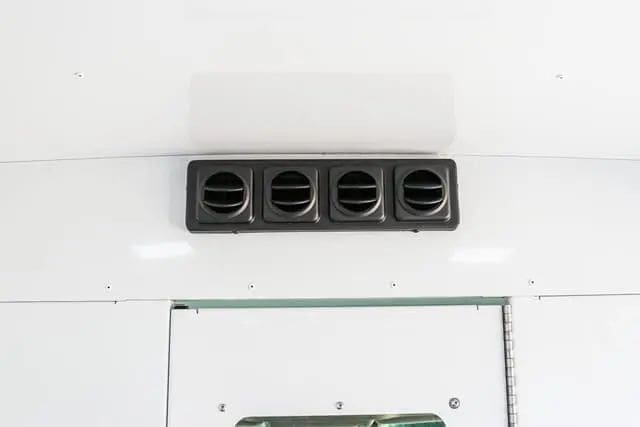
- Park smart: Whenever possible, park in shade to reduce heat damage when the clinic is not in use.
These small steps can keep your mobile clinic running smoothly, even when the Arizona sun is at its worst.
4. Rough desert roads wear down your mobile clinic faster in Arizona
Arizona is full of rough, uneven roads, especially when your clinic serves rural places like Tuba City, Kayenta, or the outskirts of Tucson. Some communities are miles off paved highways, down dusty gravel roads, or desert paths. These bumpy drives take a toll on your mobile clinic much faster than city driving.
Suspension systems get beat up. Shocks wear out quicker. Dust and sand creep into every corner of your vehicle, clogging filters and making moving parts grind. Sometimes even the exterior suffers paint chips, lights crack, and seals around doors and windows wear down sooner.
If your mobile clinic wasn’t built to handle this kind of punishment, problems pop up fast. Older units or converted RV-style builds struggle here. Their frames, doors, and equipment might not hold up well to the constant shaking and bouncing. And if a part fails far away from a major city, getting it fixed could be a long wait.
How do you handle the rough road challenge with mobile clinic maintenance in Arizona?
- Pick a solid, durable build: Mobile clinics built on van chassis hold up better than RV-style frames on rough roads.
- Protect air filters: Change filters often. Arizona’s dust can clog them fast and hurt engine performance.
- Check suspension parts regularly: Look at shocks, struts, and bushings to catch wear early.
- Seal and protect doors and windows: Make sure seals stay tight to keep dust and sand outside where they belong.
When your clinic is ready for rough terrain, you can reach more remote communities without worrying about breakdowns.
5. Mobile medical equipment maintenance in Arizona
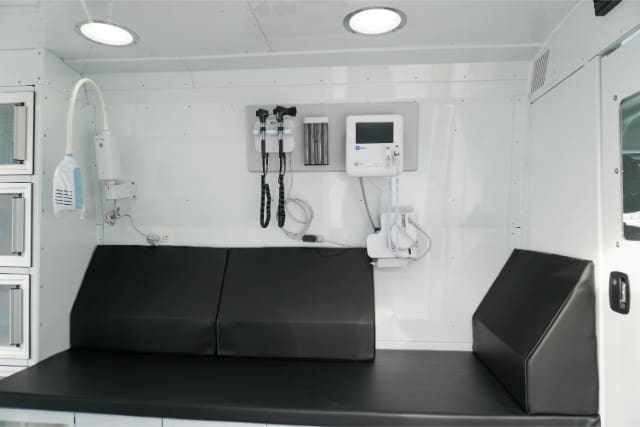
When most people think about mobile clinic maintenance in Arizona, they focus on the van itself: tires, engines, brakes. But there’s another layer that makes things tricky: the medical equipment inside your clinic.
Arizona’s dry, dusty air can sneak into your clinic and settle into sensitive machines like exam beds, vaccine refrigerators, or diagnostic tools. Even small dust particles can cause problems. Imagine pulling up to serve a community near Page or Sierra Vista, only to find your portable ultrasound or blood pressure monitor acting up because dust or heat has worn it down.
Plus, bouncing around on Arizona’s rough roads makes this worse. Equipment can shake loose or break if it’s not properly secured or designed for travel. Repairing or replacing this kind of gear isn’t as simple as swinging by a local mechanic, either. You might have to ship parts or wait for a tech specialist to drive out from Phoenix or Tucson, especially with uncommon chassis.
How do you handle the equipment challenge with mobile clinic maintenance in Arizona?
- Clean equipment regularly: Wipe down and check machines often to stop dust buildup.
- Do equipment checks before each trip: Make sure everything runs smoothly before hitting the road.
- Work with trusted suppliers: Choose equipment made for mobile use. This ensures it will hold up better to bumps and heat.
- Consider an off-road package: Some manufacturers offer off-road packages, such as the Trail Edition upgrade. This comes with better suspension, tires, and protection against Arizona’s tough terrain, so your equipment will stay safe.
Taking care of both the van and the medical tools inside keeps your mobile clinic ready to serve every patient, everywhere.
Overcome mobile clinic maintenance in Arizona with confidence
You came here wondering if mobile clinic maintenance in Arizona would be a headache, and what you could do to avoid costly surprises. You might have worried about distance, long wait times, extreme heat, rough roads, and even keeping your medical equipment working its best.
Here’s what you learned today:
- Distance matters: Picking the right build and chassis can save hours of travel and hassle.
- Wait times can stretch: Choosing common, well-supported brands means faster repairs.
- Arizona heat is brutal: You need a clinic built to handle soaring desert temps.
- Rough roads beat up vehicles: A strong, van-style build protects your unit long-term.
- Medical equipment wears out, too: Regular maintenance keeps your clinic ready to serve patients.
At AVAN Mobility, we know how much is riding on your mobile clinic. For over 10 years, we’ve helped healthcare providers, non-profits, and government organizations bring healthcare all over the U.S. But our job isn’t done when we deliver your vehicle. We stay by your side long after, offering expert advice, service guidance, and maintenance tips so you get the most life out of your investment. Our team truly listens first and builds second, because your community’s needs shape everything we do.
If you have any questions or want to learn more about the right mobile clinic for Arizona’s unique challenges, click the button below to talk to one of our friendly mobility experts.
If you’re not quite ready to chat yet, check out some of our other helpful resources to keep learning.
Start with our article on the annual costs of mobile medical van maintenance. This will give you an idea of how much to budget for.
After that, check out our article or watch the video below on mobile medical van service. You’ll better understand what you can expect if your vehicle breaks down.
